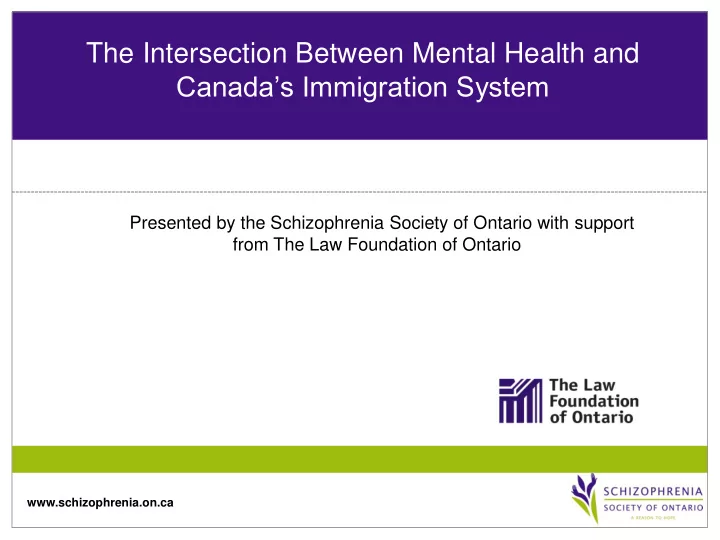

The Intersection Between Mental Health and Canada’s Immigration System Presented by the Schizophrenia Society of Ontario with support from The Law Foundation of Ontario www.schizophrenia.on.ca
What is Schizophrenia Schizophrenia is believed to be caused by a biochemical imbalance in the brain. It varies in its symptoms, severity and duration from person to person and interferes with an individual’s ability to think and feel. Contrary to popular belief, schizophrenia has nothing to do with a “split personality”. Delusions: False beliefs that have no basis or reality Hallucinations: Hearing voices that comment on their behaviour — less often they will see or feel things that are not there Thought Disorder: The tendency to jump randomly in conversation from one unrelated topic to another — sometimes rhymes or sounds are substituted for words Approximately one per cent of the population is affected. (300,000 Canadians) www.schizophrenia.on.ca
The Schizophrenia Society of Ontario • Founded in 1979 • Ontario’s largest NFP health organization specifically focused on supporting individuals, families, caregivers, and communities affected by schizophrenia and psychosis • 5 regional offices and a network of volunteers • Policy Department • Research Department • Programs Department www.schizophrenia.on.ca
Mental Illness/Criminal Justice System…………………Immigration Consequences The Criminalization of mental illness is well researched and known, however, less so are the consequences of this criminalization should one not be Canadian Canadian Citizen vs Permanent Resident vs Foreign National The compounding issue of mental illness and race www.schizophrenia.on.ca
Determinants of Health Public Health Agency of Canada, 12 determinants of health IRER Groups specific needs/challenges Income and Social Status 1. Social Support Networks 2. Education and Literacy 3. Employment/Working Conditions 4. Social Environments 5. Physical Environments 6. Personal Health Practices and Coping Skills 7. Healthy Child Development 8. Biology and Genetic Endowment 9. 10. Health Services 11. Gender 12. Culture www.schizophrenia.on.ca
The Immigration and Refugee Protection Act Under s. 36(1)(a) of the IRPA, a permanent resident or a foreign national will be considered inadmissible if he or she has been convicted (in Canada) of an offence: carrying a maximum term of imprisonment of at least 10 years; OR for which a term of imprisonment of more than six months has been imposed. S. 36(2)(a) renders foreign nationals inadmissible for less serious offences. Permanent residents are not affected by this section. Under this section, a foreign national is inadmissible if convicted (in Canada) of: An offence punishable by way of indictment; or any two offences not arising out of a single occurrence. -Use or possession of stolen or forged credit card, break and enter into commercial property (10yr upper max) -Composition of the IRB/Knowledge Gaps/Lack of Training www.schizophrenia.on.ca
Ribic Factors/Stay However, if the person is a protected person or permanent resident in Canada, they may have a right to appeal the order based on humanitarian and compassionate factors in determining whether to affirm, stay or quash the removal order. The factors to be considered are set out in Ribic v. Canada : The seriousness of the offence The possibility of rehabilitation The length of time in Canada Establishment in Canada Impact of removal on family (including best interests of the child) Hardship in the country of origin The conditions of the stay are often unrealistic www.schizophrenia.on.ca
Audley Horace Garner -After 31 years in Canada and at age 48, he was deported to Kingston, Jamaica -Gardner, who had been sponsored to Canada 31 years ago was stripped of permanent resident status after being convicted of three separate assaults dating back to 2005-offences a forensic psychiatrist attributed to schizophrenia - UN ruled Canada’s actions “Cruel and inhuman ……Leaving him without the medical and family support he depended on” www.schizophrenia.on.ca
Len Van Heest -Came to Canada from Holland 57 years ago (as a baby) and was a teenager when diagnosed bipolar, where his altered brain function triggered occasionally severe and disabling mood swings -The disease caused manic episodes where he became agitated and hostile, harming himself and others, said Justice George Locke. He amassed a lengthy criminal record-usually racked up when off medication -Van Heest was first ordered removed from Canada in 2008, but twice won stays of deportation, and each time breached the conditions by getting into more trouble with the law, said the decision. Most recently, he was charged with uttering a threat and possession of a dangerous weapon (kitchen knife). www.schizophrenia.on.ca
SSO Contract with IRB for Designated Representative Services The support offered by the Designated Representative includes: Help with finding and retaining a lawyer. Help with understanding the immigration/deportation process and how to navigate this system. Help with gathering evidence to support the case and ensuring that the client’s lawyer puts forward the best possible case to the IRB. Help with connecting to mental health treatments and supports, and other social services. Help during all immigration/deportation appearances through in-person court support. Filing and perfecting an appeal to the Refugee Appeal Division on behalf of an unsuccessful refugee protection claimant, if required. www.schizophrenia.on.ca
Recommend
More recommend